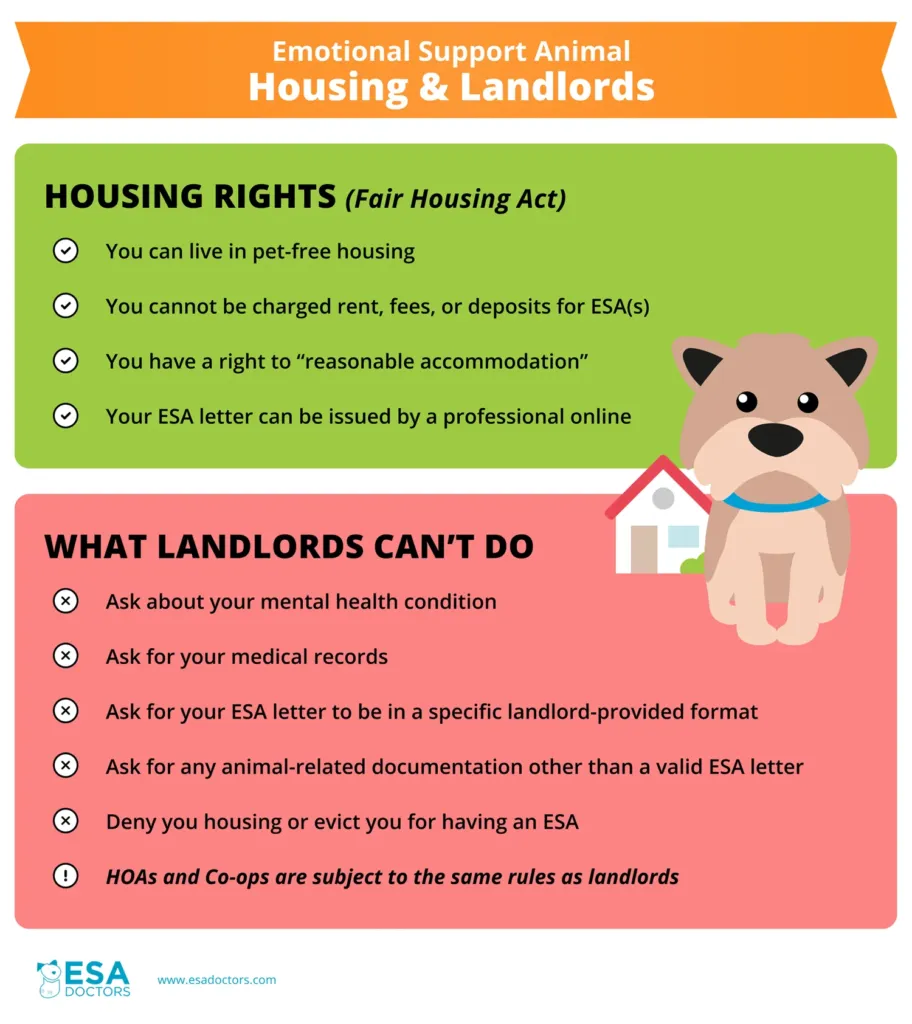The Fair Housing Act (FHA) is a federal law that safeguards tenants with disabilities. Under the FHA, a disability can be a mental health condition if it is severe enough.
Many individuals grappling with mental illness or emotional distress issues have emotional support animals (ESAs) that help manage their condition. Under the FHA, landlords have to accommodate tenants with ESAs, even if the building has a no-pets policy or other restrictions on pets.
If you are considering qualifying for an ESA or already have an ESA, this article is about your housing rights as a tenant under the Fair Housing Act.
ESA Housing Rights
The Fair Housing Act is one of the most important ESA laws that grants many rights to owners of ESAs in order to protect their ability to stay with their animals. These housing rights and the process to qualify for an ESA are addressed in guidelines published by the U.S. Department of Housing.
In summary, ESA owners enjoy the following housing rights:
- The ability to live in no-pet buildings.
- Freedom from pet fees and pet deposits.
- Exemption from pet size limits.
- Exemption from pet breed restrictions.
- Protection against discriminatory housing practices.
These rights for ESA owners ensure fair treatment for all potential and current tenants who need their emotional support animal. They promote equality and inclusivity in housing opportunities. These ESA housing rights also help to foster diverse, inclusive communities and guarantee fair treatment in the housing sector.
Why do emotional support animals get special treatment?

The FHA recognizes how important emotional support animals are to their owners. Without them, ESA owners would have a difficult time managing their mental health and be unable to live fulfilling lives. Emotional support animals are essential companions for people with conditions like depression, PTSD, chronic anxiety, and learning disorders.
ESAs are not considered normal pets under the FHA, which is why policies pertaining to pets do not apply to ESAs. They are legally recognized assistance animals that comfort people with mental health issues.
What documents are required for an emotional support animal?
Under the Fair Housing Act, a landlord has the right to ask for proper documentation for your emotional support animal. This document comes in the form of an ESA letter from a licensed healthcare professional (LHCP). Licensed health care professionals who can write an ESA letter include the following:
- Licensed therapists
- Licensed counselors
- Social workers
- Psychologists
- Psychiatrists
- Nurses and Nurse Practitioners
- Physicians and Physician Assistants
An ESA letter should be on the LHCP’s letterhead, signed and dated by the LHCP, and contain the LHCP’s contact and license information.
If you don’t know where to turn, ESA Doctors can help connect you to a healthcare professional that is licensed to assist you in your state and knowledgeable about ESAs.
What Landlords Cannot Ask You Under the FHA
When it comes to having an ESA, there are very specific rules and regulations under the FHA to protect your rights and privacy. Landlords:
- Cannot make you pay any extra rent, deposit, or fee for having an ESA
- Cannot ask you for extensive details about your disability
- Cannot make you register your emotional support animal (there is no such thing as an “official registry” for ESAs)
- Cannot request a “certification” for your emotional support animal (the only valid way to qualify for an ESA is with an ESA letter)
- Cannot require the animal to have specific training relating to a disability
Sometimes landlords will make additional demands on tenants after being presented with an ESA letter and request for accommodation. Landlords and housing providers need to proceed carefully with additional demands, as HUD guidance prohibits making certain requests.
For example, landlords can’t force a healthcare professional to use a specific form, provide notarized statements, make statements under penalty of perjury, or provide a tenant’s diagnosis or other detailed information about a person’s physical or mental impairments.
This point is especially important: in no circumstance can a housing provider require disclosure of details about the diagnosis or severity of the tenant’s disability, request medical records or require a medical examination.

When can a landlord deny an ESA under the Fair Housing Act?
Even though tenants with ESAs are generally protected by the Fair Housing Act, there are a few limited circumstances where the rules do not apply or a landlord can deny an ESA. The Fair Housing Act does not apply to:
- Owner-occupied buildings with no more than four units and
- Single-family homes sold or rented by the owner without the use of an agent
In addition, landlords can deny an ESA if the ESA poses a direct threat to the health and safety of others or would cause substantial property damage.

What if the landlord refuses to comply?
Unfortunately, some landlords can be extremely averse to ESAs or just uninformed about the rules and will put up unreasonable roadblocks to prevent tenants from living with their ESAs.
If your landlord is ignoring your ESA request, you should be aware that HUD has issued guidance stating that housing providers should respond within 10 days of receiving an ESA letter from a tenant.
Landlords also have to engage in good-faith dialogue with a tenant, making an ESA request in an “interactive process.” Before denying an ESA request for valid reasons, landlords have to allow tenants a reasonable opportunity to provide information confirming the tenant’s disability-related need for an ESA.
If you believe your landlord is denying accommodation of your ESA without proper justification, here are a couple of options:
- Make sure the landlord/owner of the property is aware of the Fair Housing Act rules and the penalties that may ensue if they fail to comply. Many landlords are often just unaware of the laws that cover them. It is always helpful to engage in a constructive dialogue with the landlord before taking more serious action.
- As a last resort, you can report and file an official complaint against the property manager/owner with the Department of Housing’s Office of Fair Housing and Equal Opportunity.
Violations of Fair Housing Rights
The Department of Housing can bring charges against landlords who fail to fulfill their obligations under the Fair Housing Act. Preventing a tenant from living with their ESA without valid justification can be considered discrimination and a violation of the FHA.
For example, in 2020 the U.S. Department of Housing brought charges against a landlord in St. Paul for discriminating against an individual with an ESA. HUD found that the potential tenant’s Fair Housing rights were violated when the landlord refused to accommodate their emotional support animal.
The Fair Housing Act and Emotional Support Animals
Understanding your rights as a tenant with an emotional support animal under the Fair Housing Act is vital to ensuring fair treatment. Don’t let landlords or property managers unjustly deny your ESA. Your rights under the Fair Housing Act protect you.
If you want to know if you qualify for an ESA, the first step involves seeking assistance from a healthcare professional. ESA Doctors can help by connecting you with licensed healthcare professionals capable of providing ESA recommendation letters to eligible individuals.
If you’re interested in obtaining an ESA, you can get started by filling out the questionnaire at the link below. This could be the first step towards securing the support and comfort an ESA can offer.
See if you qualify for an ESA letter below.
Get the Love and Support you Deserve!






Would an RV park be covered under the fair housing act. The disabled person owns their own RV, has a letter from their doctor certifying their dog as an emotional support do, but are still getting some flack from the park manager.
Mobile home communities must accept emotional support dogs and are covered under the Fair Housing Act. If the resident is getting harassed, he/she may file a complaint with the HUD.
Can a landlord insist on being provided with a dog license in California? and evict if one is not provided even when the dog has an ESA?
This may depend on the city you live in. We suggest reviewing your city’s pet license requirements. As a note, an ESA must have a legitimate ESA letter to qualify as an emotional support animal. Registries and licenses are not required nor recognized.
My pet recently became my ESA while I am at the same place of residence–is my landlord required to return my pet deposit now or at the time of vacancy?
You can request your pet deposit and let your landlord know that the Fair Housing Act does not require you to pay a pet deposit for your emotional support animal. Unfortunately, the FHA does not spell out what to do in your specific situation.
I am trying to rent a house but am told by everyone that my dog is classified as an aggressive breed (Rottweiler, Doberman, pitbull, etc) so they won’t allow her. If my therapist writes me an ESA letter, can the renters/property managers still refuse to rent to me?
You may have a Rottweiler, Doberman, Pit Bull, etc. as long as your ESA does not cause any undue financial hardships for your landlord. Please note that your ESA must be well-behaved and cannot cause damages to person or property.
Can a landlord ask you for another ESA letter from a local doctor? I received a letter for an ESA from a medical professional in another state because I’m receiving counseling virtually. What rights do I have?
Your landlord has no right to tell which doctor you can or cannot see.
I have a letter from my psychologist that I need my ESA dog and my landlord won’t let me he said no and he knows the rights he said If I do have him here he said he will kick me out. How can I get a hold of FHA and HUD to complain to them about this.
You can find more information about what to do if your landlord denies your ESA here: https://esadoctors.com/landlord-emotional-support-animal/.
There’s a “no pet” policy at the cottages I live in. I did not tell my landlord I have a service dog because he asked about pets and I do not consider him a pet, Can I get in trouble if He finds out that I never told him ?
Emotional support animals are not considered pets and must be allowed to live with you. There are a few exceptions listed above.
PLEASE HELP ME! Can a Landlord force me to move into one of their other buildings after I signed a lease and they Found out i have an ESA ? They said i withheld information but I did not get the ESA or Even Purchase the dog until AFTER the lease was signed & i have dates and proof of Dog purchase and when I was recommended ESA from my therapist. They contacted lawyers after i notified them of my ESA!
PLEASE HELP. THEYVE CONTACTED THEIR LAWYERS SAYING I WITHHELD INFORMATION WHEN SIGNING LEASE. I checked the lease on part for Animals and ESA and it doesn’t even state if you have prior knowledge or Suspicion of getting ESA to let them know. Please help. Should I Fight This???? I’m 6 months pregnant and have A 1 yr old. I don’t want to have to move if i don’t have to.
You are not required to submit ESA paperwork before signing a lease. Your landlord may be misinformed. We suggest reaching out to HUD if you want to file a complaint.
Can an ESA be denied if they are is a Breed Specific Ban law in place.
Emotional support animals are exempt from Breed Specific Laws.
I wanted to share a recent successful experience for the ESA community:
We have an ESA that is a Pygmy Goat in Miami County. “Grazing animals” are not legal to have in accordance with Code Compliance Laws despite providing a letter from a therapist. The police department issued a 30-day notice to remove the animal. I read a lot of cases and did the following and I now have permission to have the goat.
I drafted a letter specifically asking for “reasonable accommodations” in order for the disabled child to enjoy his dwelling. I encoles the rights under the FHA, ADA and argued that the HUD prevents the discrimination of specific breeds or species for reasonable accommodations. This was sent to the City Hall Public Relations and the Americans With Disabilities Act Coordinator.
Keep in mind that the animal was not violating any other issues such as nuisance issues, danger to the public or distraction to property.
The city granted our request without the need of going to court. I hope this may help someone that may be in this situation. Don’t be afraid to ask the city for help and keep a record of your progress in case there is cause for filing a civil suit for descrimination.
I live in a neighborhood with rules and covenants, and I own my home. I have a mini pig as my ESA. What does the FHA say about neighborhood associations?
The FHA overrules home owners associations and neighborhood associations.
[…] the Federal Housing Act, a disability is defined […]
Can the company that owns the housing enforce a weight limit?
Fair Housing states that weight cannot be a reason to deny an ESA.
I have 3 ESA’s in my apartment. My apartment staff gave me zero issues. My boyfriend is going to be moving in with me in future months to come with his dog. Can they deny his ESA? i am worried.
If your boyfriend’s ESA is covered by a valid ESA letter and he is a tenant in the apartment, then the landlord will need to respect his ESA under Fair Housing Act rules. The apartment must however be able to comfortably and safely accommodate all of the ESAs in the space.
My landlord is requesting that in addition to an ESA letter from my therapist, I would need to disclose my mental health disabilities. He is also requesting that my roommates write a statement that they agree to me having an esa and aren’t allergic as well as a statement saying if the cat causes any damages to the apartment they would also be held responsible. Is this allowed?
A landlord cannot make you disclose specific information about your condition. Under Fair Housing rules, tenants with ESAs have a right to privacy when it comes to their medical condition. The letter from your roommates also seems excessive and is very unusual.
[…] FHA or Fair Housing Act allows you to live with your emotional support cat, even in “no-pets” apartments and […]
Can a landlord demand you pay for replacing capit in a unit when you leave, if you have a documented ESA?
As well as making you sign documents that say you’ll pay for the new capit?
Every ESA handler is responsible for their ESA and any damages caused by the animal.
I am a real estate agent who has a customer interested in living in a condo complex that has a one per policy. She has two small dogs and suffers terribly from depression and is under a doctors care. Her dogs are the only family she really has. Can you tell me if the complex’s board can refuse her to live there with two emotional support animals? I have spoke. To a representative for the board who is suggesting she find a place that allows two dogs. Unfortunately this is the only complex she can afford.
A building’s normal policies regarding pets do not apply to ESAs. ESAs are not considered pets for purposes of Fair Housing rules. Multiple ESAs are quite common, and it is up to the tenant’s health care provider to determine if more than one ESA would be appropriate. If the tenant has proper documentation to cover both of their dogs, the housing provider should reasonably accommodate all of their ESAs.
No, emotional support animals are exempt from weight restrictions.
I just received my ESA Documents for my Doctor & my Hud Assistant Home. It states pretty much what alot of individuals comments are about the weight and breed. Of course, I will not be getting a breed that is dangerous or ENORMOUSLY huge. However, a ESA Best Friend I’ve been praying and researching/ looking for is over 20 pounds. I looked @ the Laws & no way can be denied because of their weight.
I truly hope this will not be an issue and just cannot sign the documents agreement .
Most of the ESA will be at least 50 pounds.
I really love my Supervisor and I’ve prayed alot there is no conflict.
Under Fair Housing rules, landlords are not permitted to deny an ESA solely because it is a certain weight or breed.
I have a documented disability. I also have an ESA: My children and I have been displaced and seeking shelter. The Salvation Army denied my request for temporary housing at their shelter because I have an ESA. I was told I my children could stay at the shelter but my ESA could NOT….. I advised the ESA is part of my medical treatment. I further explained , advising me that “ I could stay but not my ESA, is equivalent to advising a paralyzed- wheelchair bound person “ you can stay but you can not bring your wheelchair into the building. My children, my ESA and I were forced to sleep in the car. What can I do in this situation?
I live in a Rent Control Building. I came from an emotionally abusive relationship. The Contract we had to sign is that we can’t have ESA dog over 50 LBs or Cats. Can they put those restrictions? I want to get a Feline. My neighbor has a puppy that will get to be around 100lbs.
If you have a valid ESA the landlord is not permitted to impose categorical weight or breed restrictions.
Can a apartment demand the esa wear gear my friend got a leash that states its a esa but the apartment wants a vest. It’s a young dog and will need about 4 vests if it wears them rn till it’s fully grown
ESAs are not required to wear vests or have special cards or tags associated with them. Your apartment does not have any backing under the Fair Housing Act to require an ESA to wear special “gear”. Some ESA owners however will voluntarily obtain these items for their ESA so there is no confusion about what their animal is in a particular housing complex or on a flight.
We applied to a waiting list at a apartment and showed our Esa letter from my disabled sons doctor and were told they have weight restrictions. Is this legal under FHA
I have a tenant that moved in a house and with 1 month after moving in got 2 dogs claiming to be Emotional Support Animals. I only found out about the animals after doing an Insp. Then the wife didn’t tell me at the time that they were Emotional Support Animals, the husband unformed me the next day . I do not know what to do, I feel as I have been deceived and do not like it for my owner.
We sympathize with your situation. We always encourage ESA owners to be upfront about their ESAs and submit their requests for reasonable accommodation as soon as possible. ESA owners have the right to be accompanied by their ESA under federal law and it is not necessary to hide the ball from landlords, even though we understand that owners are very fearful about having their ESAs taken away from them.
I know the ESA exempts a pet fee and pet rent, does it exempt a refundable pet deposit?
Emotional support animals are exempt from refundable pet deposits.
I have a 2 yr old Bullmastiff that is registered emotional support dog. I also have medical documentation from my mental health psychologist as well. I was recently turned down after being told that I could move into a low income apartment high rise. The person who rejected my admission said that the reason is because of health and safety of the other tenants. This woman never met my dog and he is a docile and extremely friendly dog to everyone including other dogs and cats. I recently submitted a request for an informal hearing with the Niagara Falls Housing Authority to dispute their decision. Bullmastiff dogs are at home in apartments, condos, homes etc.. because they don’t require much activity. I am waiting for a hearing date but I really need to know everything I can before I meet with the people of the Housing Authority. It’s a federal funded housing facility. Any help will be greatly appreciated. Again, I was told that I had the proper paperwork regarding my dog’s ESA registration. From what I was told by one of the Niagara Falls Housing Authority caseworkers, that my dog will cause a problem with the other residents who complain about everything and it’s easier to just reject my application. Please help and thank you.
All that is required is an ESA letter from a licensed mental health professional. You did the right thing by contacting your local Fair Housing Authority. Good luck!
We are renting and have 2 dogs and 1 esa dog. For the 2 pets we have we paid the pet deposit and everything. Our problem is our neighbor has called the owner of the home we rent and told them our ESA dog is vicious and dangerous. We rent from a property manager, so then our property manager called us to let us know the neighbor called the owner. Now our property manager wants to come meet our esa, which is fine but also stressful. The reason our neighbor has said this is because our esa will bark at his 2 small dogs. Our boy is a german shepherd, he has never jumped the fence, never gotten out without us, never bit anyone or tried to. Our neighbor has made comments about his breed and how they are not good to have. Anyway, my question would be can the homeowner do anything to us?? We go through a reality company and have submitted our boys esa paperwork.
1st of all, take a deep breath of relief, bc you’ve got the law on your side. Neighbors can be a huge pain in the rear. However they are absolutely powerless to do anything to get rid of you or your Esa animal. I recommend checking out the Ada website and or checking out fair housing acts for service dogs and or requiring said pet deposit. so I wouldn’t worry too much just get that letter stating that you need to have either emotional support animal or service dog I do recommend service dog because it gives you so many more rights were as emotional support does not once you have that letter take that to your landlord along with a friend out copy of the Americans with Disabilities Act that’s specifically shows service dogs and tenants. After that if they refuse slap a lawsuit on them because they will be breaking the law should they evict you!
We would clarify that the qualifications for ESAs and service animals are very different, and you need a genuine need for either of them, i.e., a disability that has been confirmed by health professional. You cannot simply obtain a letter for an ESA online (at least not from a reputable provider) – you must be assessed by a licensed mental health professional licensed in your state and be given a recommendation by them. Service dogs are also required to be trained for specific tasks that help a person with a disability, whereas an ESA does not need any special training.
We live in an apartment complex that has two “esa apartments” but we don’t live in either of the two and want to get an esa animal but are refused because we are not in “esa” apartment. Is it legal for them to deny us an esa animal because we can’t get into the esa apartments due to waitlist?
Landlords must accommodate all valid requests for ESAs. It is very unusual for a landlord to have specifically assigned “ESA apartments”. A landlord can only deny an ESA in very limited circumstances, such as if the ESA poses a threat to the health and safety of others, or if the ESA accommodation would create an undue financial burden. The purpose of the ESA rules under the Fair Housing Act is to ensure that landlords grant reasonable accommodation to tenants with ESAs, even if there are conflicting building rules regarding pets.
I’m in a panic right now because I’m scared my unit will try to evict us. My husband has an ESA letter from his psychiatrist (just renewed) and we live in a no pets apartment. When we moved in, our pet addendum we signed states that our 1 dog is allowed but no other animals. However, we decided to get another ESA because her demeanor gives benefits that are different than our first ESA. Are we allowed to have our second ESA even though the pet addendum says only one animal is allowed? We didn’t think that they could legally restrict us from another ESA because they’re not just “pets”. We’re scared they’re going to try to evict us. What are our rights?
Sorry to hear about these issues. First, we are not lawyers and cannot advise on particular legal situations. Under the Fair Housing Act, landlords must respect valid ESAs that are recommended by licensed mental health professionals. Policies that apply to normal pets, including limitations on numbers of pets, do not apply to emotional support animals.
Hi!
Would you be able to tell me where you’re getting your information regarding whether ESAs are exempt from pet deposits? I’ve read The Housing & Urban-Rural Recovery Act of 1983, the only law I’m aware of that mentions deposits, and it only applies to federally assisted
housing for the elderly or persons with disabilities. There don’t seem to be any court cases that protect Emotional Support animals from landlords requiring deposits. Would you be able to direct me to which specific law or act that specifies ESAs as being deposit exempt? Thank you!
That requirement can be found in the U.S. Department of Housing and Urban Development’s FHEO Notice on Emotional Support Animals.